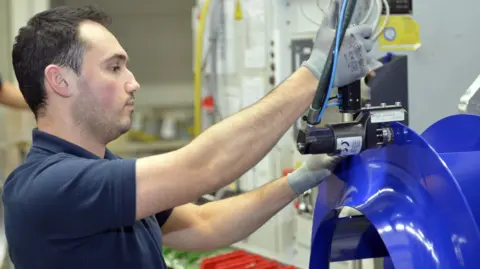 Beckhoff Automation
Beckhoff AutomationIn the 44 years since Beckhoff Automation opened for business, owner Hans Beckhoff says he hasn’t seen an economic crisis like this one.
“You can usually expect a crisis about once every five to eight years,” says Mr Beckhoff. “This time it’s a formidable crash, a really deep one.”
A German company, Beckhoff Automation makes automated control systems for a wide range of industries, including manufacturing and the energy sector.
It belongs to Germany’s famous Mittelstand, the often highly specialised small and medium-sized enterprises that make up 99% of German companies, provide around 59% of German jobs, and are considered the “hidden champions” of the German economy.
The Mittelstand’s ability to take a long view on business performance rather than scrambling for annual dividends is part of what has made German manufacturing so robust. However, the global economy is shifting rapidly, and pressure is mounting.
“We’re still doing well, though the economic situation has really slowed down,” says Frederike Beckhoff, corporate development manager at Beckhoff Automation and Hans’ daughter. “This year’s results won’t be anywhere close to what we achieved over the past three years.”
German firms have been hit by a number of problems in recent years. These include the steep energy price hikes that followed Russia’s invasion of Ukraine in 2022, rising general inflation, and increased competition from China.
Companies also complain about rundown German infrastructure, such as the country’s much criticised rail network, bridges and roads, all three of which state-owned broadcaster Deutsche Welle describes as “aging and crumbling”.
Other businesses highlight what they see as a heavy bureaucratic burden at both national and European levels, inconsistent government decision-making from Berlin, plus higher labour costs and staff shortages.
“The last three years have not been easy in Germany,” says Joachim Ley, chief executive at Ziehl-Abegg, a manufacturer of ventilation, air conditioning, and engineering systems.
“What we really need is reliable [government] decision making instead of 180-degree turns. Even if you don’t like decisions, you can at least plan and adjust if the decision is reliable. This back and forth is putting a lot of burden on companies in Germany.”
 Ziehl-Abegg
Ziehl-AbeggGermany’s coalition government fell apart earlier this month, and a general election is now set for 23 February, with a confidence vote before that on 16 December.
U-turns the government has made in recent years include walking back subsidy programmes for heat pumps and electric vehicles. This hit both domestic sales and net-zero targets. Berlin declined to comment.
But while political flip-flopping hasn’t helped German companies, many look to China as the key strain, especially on Germany’s carmakers, which have been hit by two problems.
Domestic demand for vehicles has cooled in China, and China now has a strong car industry of its own, with an aggressive export policy.
“Since the start of 2021, the Chinese export of electric vehicles has gone up by 1,150%,” says Dr Cyrus de la Rubia, chief economist at Hamburg Commercial Bank.
“That’s only EV [electric vehicles]. If you take all cars, including those running on fossil fuels, then you still get an increase of Chinese exports of 600%. During the same period, German exports increased by 60%. So there is obviously a shift in market shares happening here.”
The result of this is Volkswagen, Germany’s largest private-sector employer, threatening domestic plant closures for the first time in its 87-year history. It could result in tens of thousands of German job losses.
In October, the car manufacturer reported a 64% drop in third-quarter profits compared with a year earlier, primarily blaming a slump in demand from China, traditionally a key market for Germany’s premium car brands.
Mercedes-Benz reported a 54% decline over the same period, and BMW has also issued profit warnings, both also citing reduced Chinese orders.
Ms Beckhoff says that carmakers and the wider German manufacturing sector need to increase their competitiveness. “I really do think that productivity is something we have to take really seriously,” she says.
“The wealth we enjoy here in most parts of Germany and Europe, we can’t take it for granted.”
German manufacturers that require low-cost margins may struggle, says Mr Ley, but he believes there is hope for high-quality products with innovative features that rely on world-class engineering and intellectual property.
Dr Klaus Günter Deutsch, head of industrial and economic policy research at the Federation of German Industries (BDI), believes “much will depend on whether we are able to pull the innovation levels much faster, better and more consistently across Europe”.
There is no doubt that job losses and restructuring on their home soil will be a painful process for German manufacturers such as Volkswagen, and chemicals firm BASF, which has also warned of cuts.
However, Mr Beckhoff believes this reality check may be healthy in the longer term. “I think it is good for German industry that Volkswagen is running into some problems because it will increase motivation,” he says.
“It’s finally understood that we really have to do something. What is it that Winston Churchill said? Never waste a good crisis!”
 Getty Images
Getty ImagesSo while there is hope for a positive transformation in the manufacturing sector in the longer term, the shorter-term outlook will continue to be challenging. Whoever forms the next German government will have to make some difficult calls.
“I am still optimistic,” says economist Dr de la Rubia, who says that the need to upgrade Germany’s infrastructure is now “so obvious” that whoever forms the country’s next government will have to take action.
“I think they will say, ‘okay, the crisis is really there and now we will make a big leap’. That is my hope and my conviction.”
And many agree that this crisis may be just what Germany needs. In the post-war years, the country proved it had the capacity to produce an “economic miracle” against the odds.
The circumstances now may be different, but it’s not unthinkable that, with concerted action, it could do so again.










Hi there just wanted to give you a quick heads up and let you know
a few of the pictures aren’t loading properly. I’m not sure why but I
think its a linking issue. I’ve tried it in two different web
browsers and both show the same outcome.